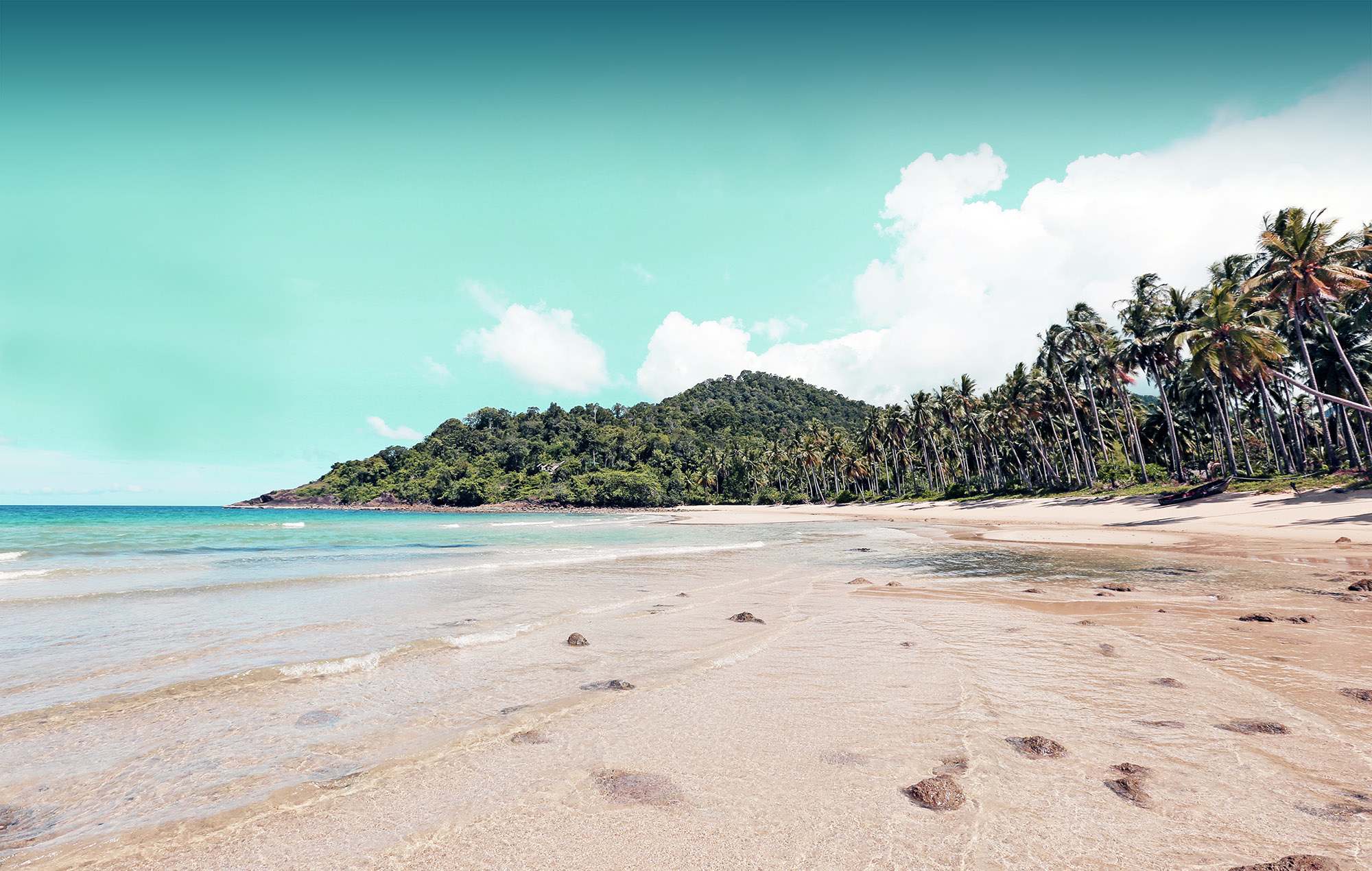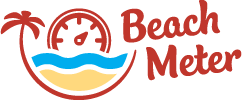A Beach Holiday in Ghana?
Area: 239,000 km² (92,000 sq. mi.)
Location: West Africa
Population: 27,000,000
Language: English (official)
Capital: Accra
Weather: Hot and humid
Coastline: 560 km (350 mi.)
Beaches: Rocky / sandy, big waves
On your next beach holiday, why not try something different? Try Ghana. It may not be the first country that springs to mind, but Ghana has everything for true beach lovers. Here we give you an introduction to some of the best beaches in Ghana.
Scroll further down, and you will find general travel information about Ghana.
Ghana’s Beaches
Ghana is situated just above equator on the Northern Hemisphere with a 560 km (350 miles) coastline facing south in the Atlantic Ocean. Here we focus on seven of Ghana’s beaches.
Click on the map
Kokrobite Beach
Easily accessible beach from Accra. It takes only 45 minutes to get there from the capital city of Ghana. The beach is arguably the best and cleanest in the vicinity of Accra. Kokrobite has a good reggae vibe with a mix of Ghanaians, expats, and tourists visiting the beach. The action is centered around Big Milly’s Backyard offering good value accommodation, a big outdoor bar, a restaurant, a great chill-out wooden deck overviewing the beach, and the legendary Mr. Bright’s Surf School.
Read more about Kokrobite Beach...
![]()
Cape Coast Beach
Cape Coast is a hub for NGO’s and volunteer projects in Ghana, so you will find several groups of young adventurers from Europe and North America. Cape Coast is also a popular stop for tourists wanting to see the Cape Coast Castle which played a central role in the horrific Gold Coast slave trade. You will find some good restaurant in town – try the vegetarian Baobab House and Oasis Beach Resort’s Restaurant – and a few good nightlife spots. The beach is narrow and there are often strong currents, so exercise caution if you go swimming.
Read more about Cape Coast Beach...
![]()
Butre Beach
Butre Beach in the Western Region offers a long stretch of pristine beach. The village of Butre is right at the beach, and a squeaky wooden bridge over a river leads you to the charming Hideout Lodge and the artsy Fanta’s Folly Beach Lodge further along the beach. Both are great places to unwind and escape from the hectic city and village life in Ghana.
Read more about Butre Beach...
![]()
Busua Beach
This is the wave surfing capital of Ghana. Great surf spots for both beginners and advanced surfers, and with two great locally run surf schools – Ahanta Waves Surf School & Camp and Black Star Surf Shop, there is no excuse not to try navigating the waves. Busua has several accommodation options, restaurants, and bars, and is perhaps the most popular holiday destination in Ghana. Busua has a nice mix of local fisherman’s life and beach holiday vibe.
Read more about Busua Beach...
![]()
Akwidaa Beach
Akwidaa is a seaside town 45 bumpy minutes from Agona. There are nice beaches on either side of the village. Just west of Akwidaa, you can stay at Ezile Bay Ecolodge. The location is beautiful with ample space, palm trees, and soft sand. East of Akwidaa you will find Akwidaa Inn, another lodge right on the beach. There are good surfing spots in the area with empty line-ups, and Akwidaa gets you right into the daily life in a Ghanaian beach village.
Read more about Akwidaa Beach...
![]()
Cape Three Points Beach
Cape Three Points is located at the southern tip of Ghana, and is in fact the nearest landpoint to the geographical centre of the world at zero latitude and zero longitude. The Cape Tree Points lighthouse marks this point. East of the lighthouse, you will find a long stretch of beach and a few small coves. The beach is wide and stunning in its beauty, and the waves are rough to the delight of intermediate and experienced surfers. Cape Three Points is also where you find Ghana’s top ecolodge, the inspiring Escape3Points Ecolodge.
Read more about Cape Three Points Beach...
![]()
Axim Beach
Axim is home to the second oldest fort, Fort San Antonio (1515), in sub-Saharan Africa, and it used to be one of the most important trading posts in the 16th century. It is also the largest city west of Takoradi. The city has a rocky beach where it is generally unsafe to swim, but there are superb beaches and accommodations a little out of town. Check out Ankobra Beach Resort, Axim Beach Resort, and Lou Moon Lodge.
![]()
Ghana Weather and Travel Seasons
The coast of Ghana has two rainy seasons and dry seasons in between. The first rainy season usually starts in May and last until July. It will rain regularly during July and August and then the second and smaller rainy season arrives in September. The rainfall is irregular, but when rain falls, it falls! Temperatures during these months will drop, and it can actually be necessary to wear a jumper at night. November to April is usually quite dry and warm.
You can travel to Ghana all year round, but be aware that some of the roads off the main highways become very hard to navigate when the rain has fallen. You will often need a 4×4 vehicle to get to Butre, Akwidaa, and Cape Three Points.
Ghana Travel Guide
If you are intrigued about visiting the beaches of Ghana, you are probably wondering about the what’s, why’s, and how’s of traveling to Ghana. We have put together a small guide for you to get you started.
Once visa and vaccinations are covered, the fun starts. Ghanians are generally very helpful and most people speak English. The infrastructure is made for local travellers and not foreign tourists, which can be good or bad, depending on how you view it. There are no scheduled buses and no taxi-meters. The most common means of transportation is by “tro-tro”, which is like a van. You would think a tro-tro fits maximum 11 people, but you may end up riding with 16 other passengers. The other option is taking a ford van or a VIP bus between bigger cities. These are more comfortable and cost slightly more. For all transportation options, they only leave once full. You may wait 5 minutes or 5 hours, depending on you timing and your destination. That’s why we highly suggest that you allow plenty of time for travelling on the road.
The roads in Ghana have improved over the last 5 years, but frankly, that’s not saying a lot. As soon as you move away from the main roads, you meet dirt roads with huge potholes. That coupled with vehicles in questionable shape, bad lighting of roads and from cars, and occasional flooded roads make traffic the number one safety concern. In general, you should avoid traveling during night.
While you will see a lot of smiles, you will also come by aggressive arguments over petty issues. A lot of the gesturing and yelling during arguments is about show, and you will very rarely see any physical contact.
Lastly, all along the coastline of Ghana, the sea can be very dangerous. Every year several people loose their lives to the sea. Waves and currents can be very powerful, and even good swimmers get in trouble, if they panic. Our recommendations are to never swim alone, be aware at all times of currents taking you out to sea, and study how to get out of rip currents before enjoying the big waves.
1) Young volunteers staying in Ghana for anything from three weeks to one year.
2) Expatriate families working for embassies, NGO’s or private international companies.
3) Backpackers traveling through the region the rough way.
4) Surfers who come to enjoy the pleasantly warm water, great waves, and comparatively empty line-ups.
For some reason, there are an extraordinary amount of Germans in Ghana. Otherwise British, Dutch, other Europeans, and North Americans dominate the tourist market. But chances are that the obruni (foreigner) sitting across you in the restaurant is German.
Ghana’s coast is still dotted with old forts and ruins from the slave trade. Don’t spare yourself a guided tour through one of the forts. You will exit humbled and sad, but life in Ghana will bring you right back to smiling.
And that brings us to perhaps the biggest attraction, the Ghanians. You will see a lot of smiles, get a lot of greetings, and witness a lot of spontaneous dancing on the streets. You will be helped if you ask, and you will have no problem finding new friends.
We have to mention funerals, as they a huge part of Ghanian social life. Should you be invited to a funeral, you should definitely go. Contrary to what you may think, funerals are actually parties, celebrating the life of the deceased and the joys of life. In Ghana, funerals are a substitute for going out on Friday and Saturday nights.
![]()
Some Valuable Resources for Ghana Travel
Here are a few other links where you can get answers to your questions about living and traveling in Ghana. Enjoy!
GhanaWeb | covers a wide range of topics in Ghana incl. beaches and travel informationGhana Westcoast | guide to the coast of Ghana from Cape Coast and westward.
Accra Expat | a comprehensive guide and forum to just about everything related to Ghana.



